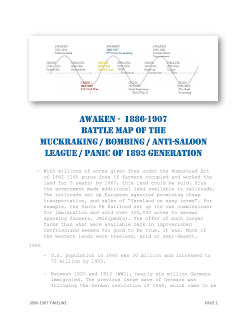TIMELINE of the
MUCKRAKING / BOMBING / ANTI-SALOON LEAGUE / PANIC OF 1893
generation
- FORMAT - PDF
- A TIMELINE OF 13 PAGES
- 10 COMMENTARIES.
TIMELINE AND COMMENTARIES @ $3.00
THIS GENERATION...
“They were the early scientists and technologists. Came to
indulge home and hearth children of the post-Civil War era. They came as labor
anarchists, campus rioters, and ambitious first graduates of black and women’s
colleges. Their young adults pursued rural populism, settlement house work,
missionary crusades, muckraking journalism and
women’s suffrage.”[1]
COMMENTARIES INCLUDE
MUCKRAKING – “The muckrakers played a highly visible role during the
Progressive Era period, 1890s–1920s.[1] Muckraking magazines—notably McClure's
of the publisher S. S.
McClure—took on corporate monopolies
and political machines while trying to raise public awareness and anger at
urban poverty, unsafe working conditions, prostitution, and child
labor.[2] Most of the muckrakers wrote nonfiction, but
fictional exposes often had a major impact as well, such as those by Upton
Sinclair.[3]”
1886 – Pre
Anti-Saloon League – “The Anti-Saloon League (formally formed 1893)
organized prohibition as an issue which brought all churches together. It was
also an issue on which they could proselytize to non-believers.”
1887 – Rev. Henry
Ward Beecher Obituary
Introduction by Sinclair Lewis
– “When the Rev. Henry Ward Beecher
(1813-1887) was sued on a charge of adultery with the wife of his friend
Theodore Tilton, the America of 1871 was ecstatically shocked.”
Schooling In The
1890s– Ursula K, Leguin – “To look at school books from 1892 or 1910 can be scary;
the level of literacy and general cultural knowledge expected of a 10-year-old
was rather awesome. Such texts, and lists of the novels kids were expected to
read a nice girl to the 1960s, leads one to believe that Americans really
wanted their children not only to be able to read, but to do it, and not to
fall asleep during it.”
1891 –
Collective Bargaining– “The term "collective
bargaining" was first used in 1891 by Beatrice
Webb, a founder of the field of
industrial relations in Britain.[2] It refers to the sort of collective negotiations
and agreements that had existed since the rise of trade unions during the 18th
century.”
Assembly
Line – “ At Ford
Motor Company, the assembly line was
introduced by William "Pa" Klann upon his return from visiting Swift &
Company's slaughterhouse in
Chicago and viewing what was referred to as the "disassembly line",
where carcasses were butchered as they moved along a conveyor.”
The Panic Of
1893 – “The Panic of 1893 was a serious economic depression in the United States that began in 1893 and ended in
1897.[1] It deeply affected every sector of
the economy, and produced political upheaval that led to the realigning election of 1896 and the presidency
of William McKinley.”
1893 The Anti-Saloon League – “It was a key component of the Progressive
Era, and was strongest in the South and rural North, drawing heavy support from pietistic Protestant ministers and their congregations, especially Methodists, Baptists, Disciples and Congregationalists.[1] It concentrated on legislation, and cared about how
legislators voted, not whether they drank or not.”
1901 William
McKinley’s Assassination – “ On September 6, 1901, William McKinley, the 25th President
of the United States,
was shot on the grounds of the Pan-American
Exposition at the Temple of Music in Buffalo, New York. He was shaking hands with the public
when Leon Czolgosz, an anarchist, shot him twice in the abdomen. <snip>
Czolgosz had lost his job during the economic Panic of 1893 and turned to anarchism, a political
philosophy adhered to by recent killers of foreign leaders. Regarding McKinley
as a symbol of oppression, Czolgosz was convinced that it was his duty as an
anarchist to kill him.”
1902 Roosevelt
Trust Busting - “Roosevelt
advocated the creation of cabinet department designed to regulate corporations
engaged in interstate commerce.[28] He also favored amending the Interstate
Commerce Act of 1887,
which had failed to prevent the consolidation of railroads.[29]


No comments:
Post a Comment